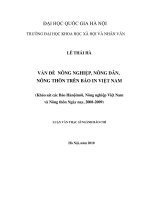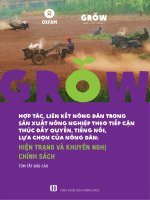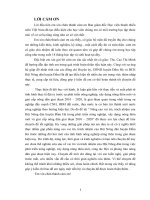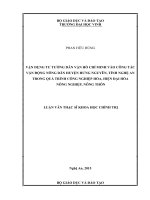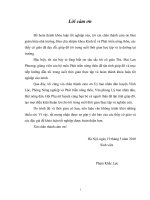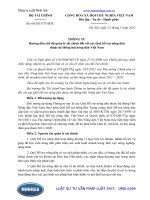Tóm tắt: Chính sách đảm bảo lợi ích kinh tế cho nông dân của một số quốc gia thành viên ASEAN trong tiến trình hội nhập và bài học cho Việt Nam.
Bạn đang xem bản rút gọn của tài liệu. Xem và tải ngay bản đầy đủ của tài liệu tại đây (513.21 KB, 27 trang )
VIETNAM ACADEMY OF SOCIAL SCIENCES
ACADEMY OF SOCIAL SCIENCES
PHAM THI MAI NGOC
THE POLICY OF ENSURING ECONOMIC BENEFITS FOR
FARMERS IN SOME ASEAN MEMBER COUNTRIES IN THE
PROCESS OF INTEGRATION AND LESSONS FOR VIETNAM
Major: International Economy
Code: 9 31 01 06
SUMMARY OF THE DOCTORAL DISSERTATION OF
INTERNATIONAL ECONOMY
HANOI - 2023
Work was completed at:
GRADUATE ACADEMY OF SOCIAL SCIENCES,
VIETNAM ACADEMY SOCIAL SCIENCE
Supervisor: 1.Assoc.Prof. Dr. Nguyen Thi Hong Nhung
2. Dr. Vu Trong Binh
Examiner 1: Assoc.Prof. Dr. Hoang Xuan Binh
Examiner 2: Assoc.Prof. Dr. Ngo Tuan Nghia
Examiner 3: Assoc.Prof. Dr. Ha Van Hoi
The dissertation will be defended before the Academy level
doctoral dissertation grading committee at Graduate Academy of
Social Sciences– Vietnam Academy of Social Sciences.
At:
Time
date month 2023
This doctoral dissertation can be found at:
- National Library
- The Library of the Academy of Social Sciences
INTRODUCTION
1. 1. Rationale for the study
Agriculture is an important sector of the Vietnamese economy,
contributing to the stability of the people's life and the country's sociopolitical security. In the current period, with the policy of developing the
agricultural and rural sectors of the State, agriculture is even more
important. Along with the economic development and integration of the
country, Vietnam's agriculture has been innovated, opened up, and
increasingly deeply integrated into regional and global markets. So far,
Vietnamese agricultural products have been present in many foreign
markets, and many agricultural products have achieved high rankings in the
world in terms of export value. As a result, agriculture has brought in a lot
of foreign currency for the country, and the lives of farmers have
significantly improved compared to before the integration. However,
agriculture is an extremely sensitive sector and is most vulnerable to the
impacts of various factors such as changes in natural conditions, climate,
shortage of fundamental production resources such as land and water,
negative impacts of the international market with fluctuations in input
prices and instability of output. This context affects the economic interests
of farmers. Therefore, the deeper the economic integration, the more
important the role of the state in formulating policies to create favorable
conditions for agricultural development and ensure the rights and interests
of farmers.
In the 5 old ASEAN member countries, Indonesia and Thailand are
the countries that share many similarities with Vietnam. Both of these
countries have favorable natural conditions (despite varying degrees) for
agricultural development, with a relatively high proportion of the
population living in rural areas. They have achieved certain successes in
overall economic and agricultural development, and have also implemented
various policies to support farmers in production and business activities to
improve their livelihoods. Additionally, they also have to cope with tough
problems in agricultural development. Therefore, studying the experiences
1
of these two countries in ensuring economic benefits for farmers will draw
valuable lessons for Vietnam.
Moreover, the current global context poses many challenges for all
economic sectors, including agriculture, as competition between countries
becomes increasingly fierce, climate change, epidemic, resource constraints,
environmental pollution, etc. In fact, this only increases the level of risk for
industries heavily reliant on external factors such as agriculture. Therefore,
this can adversely affect the interests of farmers. Thus, the Vietnamese
government not only needs to promote the country's comparative
advantages in agricultural production and export, but also needs to
implement appropriate policies to ensure sustainable economic benefits for
farmers. Because only that can create motivation for farmers to produce
with peace of mind, find ways to overcome difficulties to develop the
economy for the country.
Because of these above-stated reasons, PhD chose to research “The
policy of ensuring economic benefits for farmers in some ASEAN
member countries in the process of integration and lessons for Vietnam”
as my doctoral topic of International Economy.
2. Research purposes and tasks
The study was conducted to assess the impacts of policies on
ensuring economic benefits for farmers in two countries, Indonesia and
Thailand, based on theoretical foundations and analysis of the current
situation of these two countries in the integration process. From Vietnam's
reality and applying lessons learned from Indonesia and Thailand to
improve policies ensuring economic benefits for Vietnamese farmers in the
near future.
The research objectives of the dissertation lead to the following main
research tasks:
(1) Building a theoretical foundation for the policy of ensuring
economic benefits for farmers in the public policy system, thereby
presenting the author's viewpoint on this content as well as the key policies
affecting the economic interests of farmers in the integration process.
2
(2) Evaluating the state policies of Indonesia and Thailand in
ensuring economic benefits for farmers. From which to draw appropriate
lessons and experiences to develop policies that ensure economic benefits
for Vietnamese farmers in the new context.
(3) Based on the analysis of the basic contents of the policy to ensure
economic benefits for Vietnamese farmers at present, combined with the
lessons learned from Indonesia and Thailand’s policy implementation
experience, propose recommendations to improve the policy of ensuring
economic benefits for Vietnamese farmers in the future.
3. Objective and scope of the study
* Objective of the study
Policies to ensure economic benefits for farmers in Indonesia,
Thailand and Vietnam.
* Scope of the study
- Regarding content:
+ The dissertation focuses on researching policies in ensuring the
economic interests of farmers in Indonesia and Thailand from the
perspective of evaluating policy impacts.
+ The issue of ensuring economic benefits for farmers has a broad
scope, therefore the dissertation only focuses on studying land policies,
labor source policies, capital policies for rural agriculture development,
science and technology policies, and market policy group for agricultural
products originating from land.
+ Deep research dissertation on the impact of policies on ensuring
economic benefits for farmers in Indonesia, Thailand, and Vietnam,
specifically in the following aspects: Viewpoints, constituent parts, content,
policy requirements, human resources, financial resources, and
effectiveness of research policies.
- Regarding time:
The dissertation focuses on studying the policy of ensuring economic
benefits for farmers in Thailand, Indonesia from 2000 to present and
proposes solutions for the policy of ensuring economic benefits for
Vietnamese farmers until 2030. The author chose this study period because
3
in 1995 Vietnam joined ASEAN when Indonesia and Thailand were already
members, and from the 2000s onwards, there were more agreements and
trade cooperation between ASEAN countries, between ASEAN and other
countries and regions in the world, the EAC economic community was
formed, and standards for agricultural products among countries within the
ASEAN region were signed, providing a basis for comparison and analysis.
The data used in the dissertation are derived from the derivative data
of previous research projects, data from official websites of Indonesia,
Thailand, and Vietnam. The research used various data from WB, FAO,
ADB, EAC.
4. Research process
5. Methodology and research methods
Methodology:
The dissertation uses the methodological foundations of
international economics, applies knowledge from related fields, and
incorporates the perspectives on policies for ensuring economic benefits for
farmers from WTO, FAO, the views of the Communist Party and the State
of Vietnam in the current deep and wide economic integration period
* Research method
The dissertation employs a combination of research methods, with a
focus on the following research methods:
- Method of analysis and synthesis research
4
- Descriptive statistical method
- Expert method
- The dissertation utilizing secondary data from official organizations
and reputable scientists' studies
6. New contributions of the dissertation
The dissertation has explained the essence of the policy of ensuring
economic benefits for farmers based on its internal nature and external
manifestations. Also, the dissertation clarifies the formation basis, roles,
characteristics, influencing factors, policy evaluation criteria, and important
contents that constitute policies to ensure the economic interests of farmers.
Based on the study of the current situation of policies ensuring
economic benefits for farmers in Indonesia and Thailand, countries with
similar conditions in implementing policies ensuring economic benefits for
farmers, the dissertation has drawn valuable lessons for reference in
effectively implementing policies ensuring economic benefits for farmers in
Vietnam during the integration process.
Analyzing and evaluating the current situation of important state
policies affecting the economic interests of Vietnamese farmers in the
process of integration, thereby clarifying the advantages and limitations of
these policies to find solutions.
Proposing an orientation viewpoint for solutions to improve the
effectiveness of policies ensuring the economic interests of Vietnamese
farmers in a new context On that basis, the author proposes a feasible and
comprehensive system of solutions aimed at ensuring the economic
interests of farmers in the integration process.
7. Theoretical and practical significance
* Theoretical significance
Based on a review of theoretical and empirical studies that have
been conducted, the dissertation has clarified the essence of policies
ensuring economic interests for farmers. Furthermore, the author has clearly
identified the role and impact of policies ensuring economic interests for
farmers on the process of stabilizing and developing the economy and
society of each country.
5
* Practical significance
The author analyzes the viewpoints, orientations, objectives and
requirements for improving policies ensuring the economic interests of
farmers in the context of Vietnam’s deep integration into the region and the
world. Based on the strengths and limitations of the policy, the author
proposes some recommendations to better ensure the economic interests of
farmers in the integration process.
In addition to introduction and conclusion, the structure of this
dissertation includes 4 chapters:
Chapter 1: An overview of research on policies ensuring the
economic interests of farmers
Chapter 2: Theoretical basis for policies on Ensuring Economic
Benefits for farmers in the process of international economic integration
Chapter 3: Current status of policies on ensuring the economic
benefits of farmers in the economic integration of Indonesia and
Thailand.
Chapter 4: Current status and prospects of policies to ensure
economic benefits for farmers in Vietnam and some recommendations
from experience of Indonesia and Thailand
Chapter 1
AN OVERVIEW OF RESEARCH ON POLICIES ENSURING THE
ECONOMIC INTERESTS OF FARMERS
1.1. Overview of studies related to the topic
Studies from different approaches and economic contexts on the use
of agricultural policies to ensure economic benefits for farmers in general,
the policy of ensuring economic benefits for farmers in Indonesia, Thailand
and Vietnam have been mentioned by many authors. Within the framework
of the dissertation, the author focuses on studies related to the impact of
agricultural policies on ensuring economic benefits for farmers in the
integration process to draw relevant comments on research results that have
been carried out.
6
* Foreign studies
* Domestic studies
1.2. Review of the research done and research gaps
* Review of the research done
Research works on policies affecting the agricultural sector to ensure the
economic benefits of farmers are carried out in many different angles, in the
context of foreign and domestic research space. The previous author's
studies have provided a picture of the policy system to ensure farmers'
economic benefits, which focuses on policies on land, human resources,
capital, science and technology and market. At the same time, studies have
initially analyzed the impact of policies on ensuring the economic benefits
of farmers in Asian economies, especially ASEAN countries such as
Indonesia, Thailand.
- In Indonesia, the authors assess that the policy to ensure economic
benefits for Indonesian farmers has not yet deeply affected the factors that
change farmers' incomes
- In Thailand, studies show that there are policy changes for farmers in the
new economic context. The Thai government has stepped up the promotion
of agricultural science and technology policies, policy of expanding the
export market of agricultural products to ensure Thai farmers participate in
effective agricultural product chains.
- In Vietnam, there are many issues of economic benefits that directly affect
farmers, but policies that ensure economic benefits for farmers are still
unclear, so farmers still suffer economic disadvantages. The policy system
to ensure the economic benefits of farmers has not kept pace with the reality
of farmers' economic activities in regional and world integration. There is a
requirement to have research, review, reference and study so that the policy
for farmers is really to protect farmers.
* Research gaps
Theoretically, up to now, there has been no research, systematic explanation
of the theoretical basis of the policy to ensure the economic benefits of
farmers in the integration process. Accordingly, the thesis will: (1) Develop
the concept, basis of formation, roles, characteristics, influencing factors,
7
evaluate policies and identify pillar policies on ensuring economic benefits
for farmers; (2) draw lessons from the implementation of policies on
ensuring the economic benefits of farmers in some ASEAN countries that
can be applied to Vietnam's conditions.
Practically, it shows that there are many policies on ensuring economic
benefits for farmers that are no longer appropriate, and it is necessary to
make adjustments in policies. Therefore, the thesis has: (1) Analyzed the
current situation of policies on ensuring economic benefits for Vietnamese
farmers in the integration process from 2000 to present, pointed out the
advantages and limitations of the policy; (2) Proposed suitable solutions for
farmers to ensure their economic benefits in the new economic context.
Chapter 2
THEORETICAL BASIS FOR POLICIES ON ENSURING
ECONOMIC BENEFITS FOR FARMERS IN THE PROCESS OF
INTERNATIONAL ECONOMIC INTEGRATION
2.1 Concepts, roles, characteristics, influencing factors and criteria for
evaluating policies on ensuring farmers' economic benefits
* The concept of policies on ensuring the economic benefits of
farmers
Policy to ensure economic benefits for farmers is the totality of
economic policies, guidelines and strategies used by the State to influence
agriculture, rural areas and farmers in order to improve the efficiency of
agricultural production, develop rural areas and ensure the income of
farmers.
Within the research scope of the thesis, when it comes to policies on
ensuring the economic benefits of the State for farmers, the author focuses
on some of the following contents:
Firstly, the subject of the policy to ensure economic benefits for
farmers is the state, the state subject here is limited to the National
Assembly, the Government, and the ministries. Therefore, in this study,
specific policies in local government are not mentioned. The subjects
8
receiving the guarantee of economic benefits are individuals, organizations
and households, directly involve in the production process in agricultural
industries and use land as the main means of production.
Secondly, farmers are a group of people living in rural areas and their
main economic activity is agricultural production. The impact of economic
policy on ensuring the benefits of farmers must be considered in many
aspects, in which the thesis focuses on researching policies on ensuring the
economic benefits of the State for farmers through ensure agricultural
economic development. Therefore, the policy to ensure effective
agricultural development is also to ensure the economic benefits of farmers.
Third, each state has its own perspective and its own historical origin
in dealing with farmers, which, in turn, this perspective system has a
profound influence on the ways, means and tools to implement policies for
farmers.
* The basis of policy formation to ensure economic benefits for
farmers in the context of international economic integration
The specificity of agricultural production compared to other sectors in
the economy
The role of agricultural production in socio-economic stability and
development
The role of farmers in the goal of sustainable agricultural development.
The inevitability of the state's economic regulation in the market
economy and the role of the state in agricultural production.
* The role of policies on ensuring the economic benefits of the state
for farmers
Create a legal and economic environment to encourage agricultural
development in line with the goals set by the State in each period.
Regulate to limit inappropriate agricultural developments
* Features of policies on ensuring state economic benefits to farmers
The policy of ensuring economic benefits for farmers is supportive,
because farmers suffer losses in economic activities.
The policy to ensure economic benefits for farmers has distinct
characteristics of the territory and natural conditions.
9
Sometimes the policy to ensure the economic benefits of the state for
farmers is not for the sake of the economic efficiency of the policy, but for
social stability, ensuring more economic benefits for farmers.
Setting policies on ensuring farmers' economic benefits in the general
policy system of the state and according to the actual development
conditions in each country
* Factors affecting policies on ensuring farmers' economic benefits
Natural laws, ecological laws, climate changes and socio-economic laws
Perspective of the state’s development and resources
The level of development of agriculture
Agricultural economic integration and international commitments
* Evaluation of policies on ensuring farmers' economic benefits in
the context of international economic integration
Evaluating policies on ensuring farmers' economic benefits is the
process of considering, comparing and evaluating the objectives, content
and effects of the policy to make appropriate recommendations on the basis
of the socio-economic interests of the community.
Evaluating policies to ensure economic benefits for farmers is directly
related to agricultural policy.
Evaluating policies on ensuring farmers' economic benefits focuses on
the following aspects:
- Policy impact
- Evaluation of the degree of completion of the policy's objectives:
- Through the evaluation of policy results to make useful
recommendations and necessary data for further improvement
2.2. Content of policies on ensuring farmers' economic benefits in
integration time
The policy to ensure the economic benefits of farmers is always
attached and adjusted in accordance with the different development
processes of the agricultural and rural sectors and the goal of improving
farmers' incomes. The system of policies that deeply affect farmers'
incomes includes key economic policies that affect the inputs and outputs of
10
the production and consumption of agricultural products, specifically as
follows:
- Land policy
- Policy on agricultural human resources
- Policy on investment capital for agricultural and rural infrastructure
and credit capital for farmers
- Policy on scientific and technological development, research and
encouragement of the transfer of scientific and technical advances to
farmers
- Policy on organization and management of agricultural market
Sub-conclusion of chapter 2
The policy to ensure the economic benefits of farmers in the context of
international economic integration is a system of views and policies of the
State towards agriculture and farmers; the potential and system for the
state to achieve its goals, ensuring economic benefits for both the country
and farmers; the system of tools and apparatus used by the state to organize
the implementation of selected objectives; The selected targets are suitable
to the actual situation of agriculture, farmers and the integration period.
The State must stand with farmers to not only ensure that farmers'
incomes are not too low compared to other classes of the population, but
also help farmers build modern agriculture.
In the current regional and international economic integration, the
domestic and international environment is always changing, posing a
requirement for developing economies to re-evaluate new opportunities
opened up for farmers to define economic policies for farmers that are
effective and consistent with regional and international sanctions. Instead
of applying traditional tools to ensure economic benefits for farmers,
countries need to switch to new tools that do not conflict with commitments
with international economic organizations such as land planning
infrastructure development, foreign capital investment, and quality
improvement of human resources, market development and other assurance
policies of the State. The choice of policies depends on the specific
conditions of each country as well as the policy objectives for each
11
country's farmers. Develop policies on ensuring the economic benefits of
farmers on the basis of the value chain of agricultural products that
farmers in each country integrate with the aim of creating added value and
effective competition for farmers' products.
Chapter 3
CURRENT STATUS OF POLICIES ON ENSURING THE
ECONOMIC BENEFITS OF FARMERS IN THE ECONOMIC
INTEGRATION OF INDONESIA AND THAILAND
3.1. A general picture of the agricultural sector of ASEAN
countries and its integration process
The ASEAN region has many favorable conditions for agricultural
development, which supplies agricultural products to the whole world,
especially rice. Thanks to the development of production, agricultural
export activities of ASEAN countries have achieved many good results, the
growth of agricultural exports has always been high for a long time. Trade
cooperation is carried out within the bloc, FTAs and implementation of
sustainable agricultural development initiatives at national and global levels.
3.2. The current situation of the policy system to ensure economic
benefits for Indonesian farmers in the process of international
economic integration
Changes in Indonesia's agricultural strategic orientation
Indonesia's agricultural sector plays an important role for this country
with the largest population in ASEAN. An important objective in
agricultural development in Indonesia is sustainable development to ensure
food security and increase agricultural competitiveness, which is clearly
reflected in the national agricultural development strategies.
Some policies on ensuring economic benefits for farmers in
Indonesia
Policy on increasing the area of agricultural land to ensure the
consumption demand of main agricultural products in the country can be
met.
Policy on stabilizing agricultural human resources, supporting farmers
to start a business, training "smart farmers".
12
Policy on developing investment capital for rural infrastructure through
improving investment regulations and supporting loans to farmers.
The policy of agricultural mechanization combines the application of
science and technology, gradually applying science and technology to
agriculture.
The policy of subsidizing inputs for agricultural materials and
ensuring the output supply for main agricultural products purchased by
BULOGs at higher prices than the market, offering market initiatives by
“farmer shops”
3.3. Current status of policies to ensure economic benefits for
farmers in Thailand's economic integration
Changes in Thailand's agricultural policy and strategic direction
Thailand has repeatedly adjusted its strategic orientation and
agricultural development policies, from expanding agricultural exports to
have resources for industrialization to focusing on transferring agricultural
technology and developing sustainable agriculture. Socio-economic
development plans are implemented every five years with the philosophy of
"full economic development" and the main objective is to develop national
agriculture towards the fulfillment of national goals for safe farmer, affluent
agricultural areas and sustainable agricultural resources.
Some policies to ensure economic benefits for Thai farmers
Policy to increase the area and efficiency of agricultural land use,
attach importance to the development of organic agricultural land fund.
The policy of developing high-quality agricultural human resources
to meet the requirements of integration and effective training of "smart
farmers" and “smart farmers group”.
Policy to concentrate budget to develop modern agricultural
infrastructure and prioritize agricultural credit capital for export and
processed agricultural products.
Investment policies for science and technology and digital
transformation strategies in agriculture, strong links between research
institutes, universities and farmers towards “smart agricultural products”
13
Market support policy for Thai agricultural products to ensure the
economic benefits of farmers, Thai agricultural products to integrate
effectively with the world market.
Assessing the impact and lessons learned from state policies to
ensure economic benefits for Indonesian and Thai farmers in the
integration process
Indonesia and Thailand are two countries with similar natural and
social conditions to Vietnam. Along with the general development of the
economy, the specific circumstances of the country in each period and the
set goals, both countries have made adjustments in the strategic orientation
of agricultural development in their respective countries in each historical
period, in order to develop agriculture to ensure benefits for farmers' lives,
and to integrate into the agricultural economy effectively.
Both countries have clearly identified the goal of ensuring economic
benefits for farmers, which is the key to successful agricultural integration,
maintaining the country's socio-political security order, contribute to the
rich people and strong country. Policies aimed at ensuring economic
benefits for farmers in Thailand and Indonesia include:
- Land policy needs to be effectively managed, planned and used to
protect farmers. In conditions of crowded land such as Indonesia and
Thailand, improving land use efficiency and increasing the value of
agricultural products by focusing on clean agricultural production programs
that are in line with market needs is important.
- The agricultural labor resource policy aims to train farmers who are
good at farming, in order to grasp the knowledge of modern production and
new technologies, especially the application of digital technology, market
knowledge, laws, knowledge about integration, ... to create a labor source
that meets the high requirements of integration, love the job, and stick with
the profession.
- Policy on agricultural infrastructure development and credit capital
for farmers, focusing on rural infrastructure development to facilitate
agricultural production, supporting farmers to help buy input materials and
14
sell products in the most profitable way, avoiding the risk of damage caused
by the impact of nature as well as the impact of the market.
- Both countries recognize that technology is an extremely important
factor to help improve agricultural production efficiency, overcoming
existing limitations. The policy focuses on research to transfer to farmers
high yielding varieties of good quality, overcome the limitations of soil and
climate conditions, enhance information exchange and help farmers access
techniques that make it easier, more convenient, less expensive, and more
efficient.
- The market policy to support agricultural products focuses on
solving output products for farmers, ensuring products are sold at good
prices, ensuring farmers' profits, and minimizing risks and financial losses
due to market volatility.v.v.
Thanks to positive policies, Indonesia and Thailand have used
agricultural land resources reasonably, more and more efficiently. People in
these two countries are increasingly adept at farming, especially Thai
farmers in the context of integration. The agricultural infrastructure of the
two countries has been significantly improved, agricultural science has
developed at a good level, attracting more and more FDI flows into
agriculture, and both countries have many agricultural products exported to
many countries around the world. Many Thai agricultural products rank
high in terms of output and export volume, contributing to improving the
lives of farmers.
Those are the successful lessons of Indonesia and Thailand.
However, Indonesia also gives priority to too much land for rice production,
which easily leads to an imbalance in their food structure and the State does
not yet have a long-term agricultural land use strategy affecting to
agricultural productivity. Regarding labor policy, Indonesian agriculture has
just implemented a policy to develop professional skills for people on a
small scale, unable to connect with people through professional
organizations, so the level of farmers is still low, affecting labor
productivity. Thailand does this much better than Indonesia. The policy of
budgetary capital for agricultural infrastructure development pushes rural
15
areas and credit capital for farmers to be limited in that capital from the
state budget accounts for a small proportion, mobilized capital from other
resources is not high and not meet the needs of development. Capital
policies for the people are not very effective because there are too many
intermediary stages from the policy to the people, and it is still difficult for
people to access state capital.
Science and technology policy requires a lot of capital and the
attention of many industries. The two countries, especially Indonesia, have
not done this well, so the level of technology used in agriculture is about 10
years behind other countries in the region. The state needs to increase
spending on agricultural extension research and development activities,
market policy standard certifications are done very well by Thailand,
however, too much government control over the market can cause
distortions (rice prices). Indonesia also supports the market for farmers to
stabilize their lives and socio-political security, but excessive support can
be a barrier to the country's agricultural developmen.
The lesson learned is:
Lessons on effective planning, management and use of agricultural
land to protect farmers.
Lessons on improving farmers' labor skills and qualifications to meet
the requirements of modern agricultural production, linking them with
benefits in agricultural and rural organizations.
Lessons on key capital support for agricultural and rural
infrastructure and credit for farmers to develop production and improve
living standards of agricultural workers
Sub-conclusion of chapter 3
Indonesia and Thailand are two countries in the ASEAN region, with
agriculture being an important economic sector to ensure social security
and national security. Along with the general development of the economy,
the specific circumstances of the country in each period and the set goals,
both countries have made adjustments in the strategic orientation of
agricultural development in their respective countries in each historical
period. The policy to ensure economic benefits for farmers is shifting from
16
resource management to management of factors connecting the agricultural
production chain.. All in order to achieve the goal of agricultural
development to ensure income for farmers, towards an effective
agricultural economic integration.
From the two countries Indonesia and Thailand, the lesson that can
be learned for Vietnam is to learn from good experiences in formulating the
above policies so that agricultural land is protected and more and more
quality, high efficiency. Farmers will be less in quantity but quality will be
improved, able to cope with all market events in the context of integration.
Agricultural infrastructure is improved, contributing to supporting people
to produce and trade agricultural products conveniently, reduce
unnecessary costs, and increase profits. Attracting FDI sources not only
with agricultural infrastructure and high-quality human resources but also
with attractive and stable policies and mechanisms for investors. Along
with that, the policy on science and technology needs to create a
breakthrough for agricultural production, overcome the limitations of
current agriculture, and create many good quality products with high
prices. Market policy should focus on closely following all stages of the
production and business process to help support farmers in a timely
manner, and must be consistent with commitments under international
agreements that Vietnam participates in.
Chapter 4
CURRENT STATUS AND PROSPECTS OF POLICIES TO ENSURE
ECONOMIC BENEFITS FOR FARMERS IN VIETNAM AND SOME
RECOMMENDATIONS FROM EXPERIENCE OF INDONESIA
AND THAILAND
4.1. Current status of policies to ensure economic benefits for
farmers in Vietnam
The general objective of the policy to ensure economic benefits for
farmers in the integration process of Vietnam is to improve and enhance the
lives of farmers, specifically:
17
Agricultural land policy focuses on the contents of agricultural land
prices, encouraging land accumulation and concentration, land acquisition
and compensation, and agricultural land tax policy.
The agricultural human resource policy focuses on adjusting the
labor structure and improving the quality of the agricultural labor force.
Policy on investment capital for agricultural and rural infrastructure
and credit support for farmers.
Science and technology policy in agriculture focusing on application
of science and technology, research on agricultural modernization.
Market policy and agricultural product prices follow throughout the
process from production to consumption to focus on exporting quality
agricultural products at good prices.
Assessing the impact of agricultural policies on ensuring the
economic benefits of Vietnamese farmers in international economic
integration
From the perspective of putting farmers at the center of socioeconomic development and the goal of ensuring economic benefits for
farmers in the integration process of Vietnam has been implementing many
policies to ensure economic benefits for farmers.
As a result, farm households have land for agricultural production, do
not have to rent agricultural land, can use land as collateral to borrow bank
loans for production, create conditions for farmers to restructure the
agricultural economy to be proactive in production.
The State supports vocational training to convert some agricultural
workers to other fields, retain workers who really love farming, and help
them improve their skills in a modern direction through agricultural
extension activities.
Infrastructure in agriculture is significantly improved and farmers are
supported with capital through forms that are appropriate to international
circumstances and regulations; including exemption from agricultural taxes
and loans to buy agricultural materials. Modern science and technology
were gradually introduced to farmers and had initial results.
18


